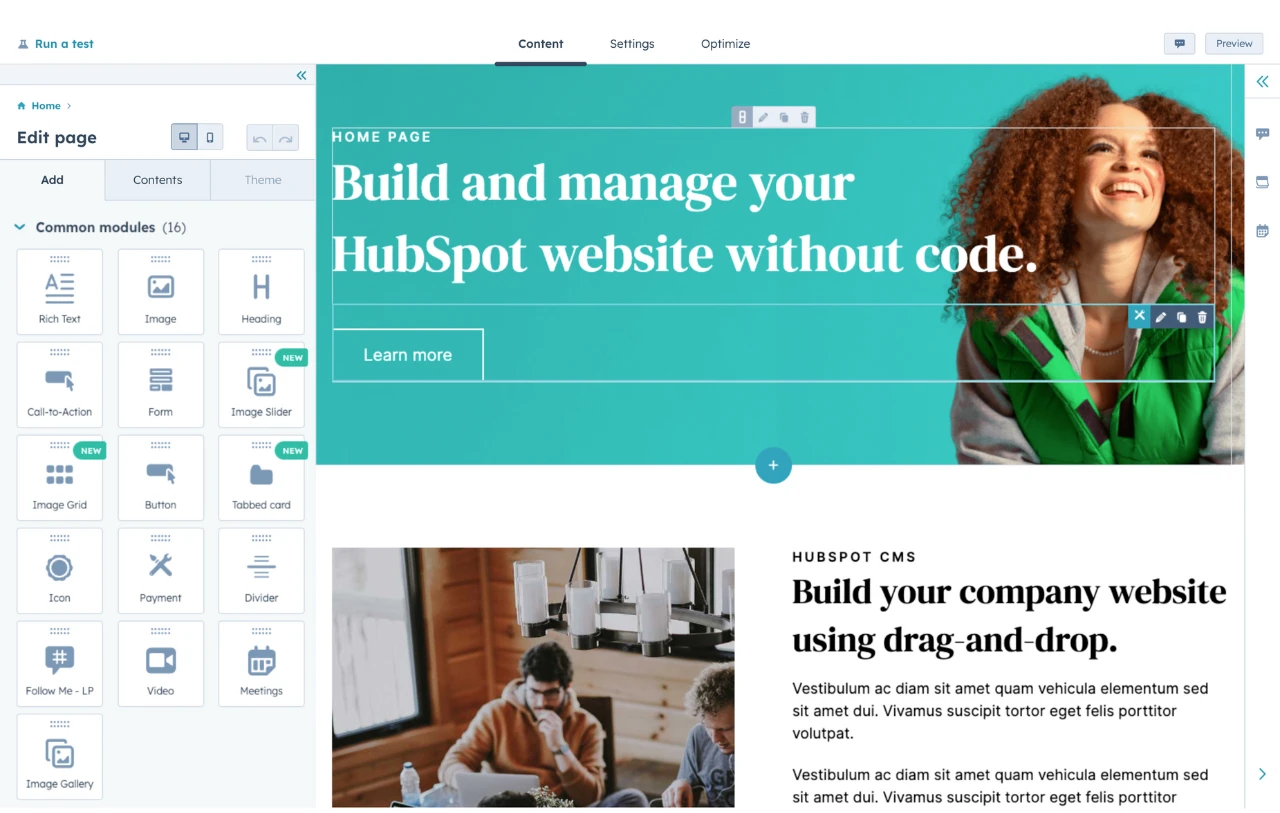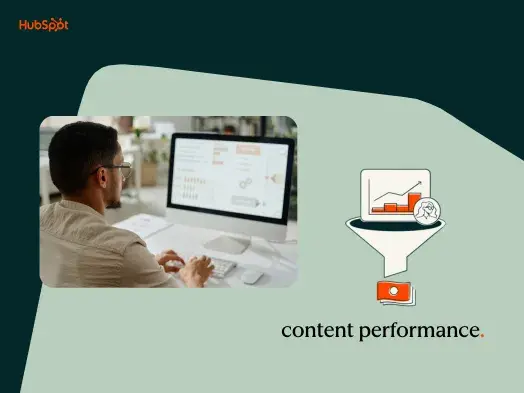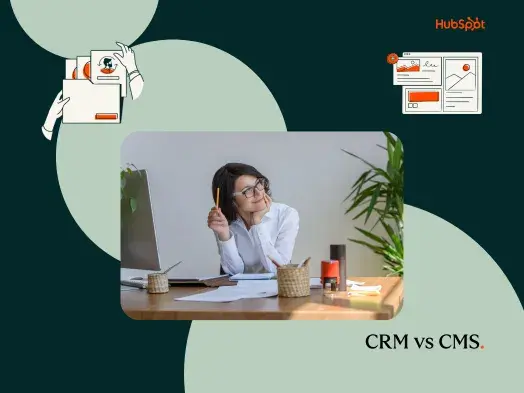Read on to learn more about this incredibly useful content management technology, including how it differs from monolithic platforms, and which headless CMS vendors are worth your budget.
Table of Contents
- What is a headless CMS platform?
- Headless CMS vs. Traditional CMS
- The Best Headless CMS Platforms by Category
- How to Choose a Headless CMS Platform
- Frequently Asked Questions About Headless CMS Vendors
- Headless CMS Vendors: Which will you choose?
What is a headless CMS platform?
A headless CMS platform separates the backend content management system from the front-end presentation layer — in fact, a headless CMS typically doesn’t even come with a front end. This allows developers to employ any programming language or framework of their choice to construct custom front-end experiences while simultaneously allowing content creators to manage and create content from within a single back-end system.
APIs are what make this possible. With a headless CMS, the content is stored and managed separately from how the CMS displays it on the website or application. Rather than having an in-built interface to show what you've written, developers can use APIs to pull this data into custom HTML, CSS, and JavaScript experiences that they themselves create — meaning they are truly in control of their presentation layer.
If the back end is the “body,” and the front end is the “head,” then a headless CMS emphasizes the break between content management functionality at its back end and the presentation layer up front.
You can see the architectural difference illustrated in the graphic below. With a traditional CMS, you have a single database connected to a single set of back-end/front-end tools, delivering to a single channel. But with a headless CMS, the API comes in and makes one system serve many channels.

Headless CMS vs. Traditional CMS
The benefits of headless CMS platforms are real, but both headless and traditional CMSs also come with their own set of drawbacks, all of which you can see in the comparison table below.
|
FEATURE |
HEADLESS CMS |
TRADITIONAL CMS |
|
Presentation Layer |
Disconnected from the content management system. |
Get content management capability as part of the package. |
|
Flexibility |
Provides ultimate developer flexibility. You can use any programming language or framework for your projects. |
Technology stack constraints. |
|
Customization |
A world of possibilities with greater personalization options. |
Fewer personalization choices. |
|
Complexity |
Can be more complicated to implement and maintain. |
Easier to set up and administer for streamlined efficiency. Easier for non-technical content creators to use. |
|
Use Cases |
Good for unique or complex and omnichannel front-end experiences. Great for integration with other tools and systems. |
Perfect for smaller projects, tasks that are relatively simple to complete, and a single website. |
|
Updates |
Cloud-hosted (SaaS) headless CMS platforms typically handle platform updates automatically, while self-hosted solutions require you to manage updates manually. |
It’s the same for cloud-hosted traditional CMS platforms. |
|
Costs |
Building a headless infrastructure, hiring developers, and creating a separate front end are costs that will inevitably add to the total expense. |
Costs can be lower because there's less complexity and less need for developer resources (but not always). |
|
Server Downtime |
Maintenance on the back end is less likely to disrupt front-end applications, since content management and presentation are decoupled. |
Server downtime has a major effect on both the front and back ends. |
|
Hosting and Delivery |
Hosting can be cloud-hosted or self-hosted. |
Hosting can be cloud-hosted or self-hosted. |
When Should You Choose Headless Over Traditional CMS?
In general, I recommend that small businesses or individuals stick to the traditional CMS approach, as it‘s less complex and doesn’t require development knowledge to make front-end changes, or even to set up the CMS.
However, large organizations that need more flexibility should really consider the headless approach. Your developers will be able to use the programming languages that they want to build your front-end experiences, and you’ll also be able to deliver content to any location, which is important if users will interact with your content in multiple ways (e.g., your website and a separate mobile app).
Large organizations will also be able to better handle the extra complexity that the headless approach requires.
Need a quick decision checklist? I’ve got you. The more questions you answer yes to, the more likely you should use a headless CMS.
- Does your business display content on multiple channels (e.g., smartwatch, mobile app, website)?
- Are you using multiple CMSs to display your content?
- Do you have developer resources?
- Does your development team complain about the rigidity of your existing traditional CMS?
- Will your non-technical team members (content creators, marketers, etc.) still be able to easily manage, edit, and publish content — without constantly needing to tap developers?
The Best Headless CMS Platforms by Category
Alright, you’ve made it this far, which means you’re considering switching to a headless CMS — how exciting! Now, you need to know the best headless CMS vendors.
I've selected seven solid solutions based on the following criteria:
- API & developer flexibility: Does it support REST, GraphQL, or both? Can developers use their preferred languages and frameworks?
- Content authoring experience: How intuitive is the back end for non-technical users like marketers and content creators?
- Deployment options: Is the platform cloud-hosted, self-hosted, or both?
- Pricing accessibility: Does it offer free tiers or affordable entry points, or is it enterprise-only?
- Integrations: How well does it connect with commerce platforms, marketing tools, and other systems?
- Target use case: Is it optimized for publishing, commerce, general-purpose websites, or enterprise-scale operations?
Below, I'll review each headless CMS platform, grouped into the following categories:
- Enterprise: Best for large organizations needing advanced security, scalability, and dedicated support.
- Mid-Market: Ideal for growing businesses that need flexibility without enterprise-level complexity or cost.
- Open Source: Great for developers who want full control and are comfortable managing their own infrastructure.
Additionally, I will explicitly call out whether the CMS is headless-first or hybrid (a traditional CMS that has headless capabilities).
Here’s a quick comparison matrix before you dive into the details:
|
CMS |
Architecture |
Best for |
Pricing |
|
WordPress VIP |
Hybrid (headless-capable) |
Large organizations that want enterprise-grade scalability and security while keeping the familiar WordPress authoring experience. |
Starts at $25,000/year. |
|
Contentful |
Headless-first |
Developer-first teams that want a mature, API-first CMS with strong SDKs and tooling to power large-scale, multi-channel digital products. |
Free plan (10 users, 100K API calls/month); Lite: $300/month; Premium: custom pricing. |
|
Kontent.ai |
Headless-first |
Enterprises managing complex, multi-channel content operations that require strong governance, collaboration, and AI-assisted workflows. |
No public pricing; quote-based using a calculator (users, content types, content items). |
|
Hygraph |
Headless-first |
Teams that rely heavily on GraphQL and need to unify content from multiple systems into a single API using content federation. |
Free Hobby plan; Growth: $199/month (billed annually); Enterprise: custom pricing. |
|
Sanity |
Headless-first |
Organizations that want a highly customizable, real-time collaborative content platform that balances a strong editor experience with deep technical flexibility. |
Free plan; Growth: $15/seat/month; Enterprise: custom pricing. |
|
Ghost |
Hybrid (headless-capable) |
Independent publishers and small media teams focused on blogging, newsletters, and memberships who want an excellent writing experience with optional headless delivery. |
Self-hosted: free; Ghost(Pro) starts at $15/month (billed annually). |
|
Strapi |
Headless-first |
Developers and teams looking for an affordable, open-source headless CMS with full control over hosting, APIs, and customization. |
Core software: Free; Paid CMS features start at $45/month; Cloud hosting from $15–$375/month. |
Enterprise
1. WordPress VIP
Architecture: Hybrid (headless-capable)
Best for: Large organizations that want enterprise-grade scalability and security while keeping the familiar WordPress authoring experience.

I think the WordPress VIP platform is best for providing a fully decoupled CMS capability that offers flexibility. Users are able to take advantage of its single stack, headless, or hybrid features, while creating content and digital experiences.
Users will benefit from its content agility, enterprise reliability and scalability, comprehensive security, content management, and commerce. WordPress VIP’s customer base includes big brands like Facebook, Salesforce, CNN Brasil, and Pew Research Center.
WordPress VIP integrates with platforms such as Salesforce and WooCommerce, making it especially useful if you already use one of those software.
WordPress VIP is also an especially good option if your content and marketing teams are already familiar with the WordPress dashboard, as they’ll be able to manage everything on the back end using a familiar interface.
Pro tip: There are plenty of ways to implement headless WordPress beyond WordPress VIP. I think the WPGraphQL plugin is a great place to start, as it adds an extendable GraphQL schema and API that you can use to implement your own headless WordPress setup.
Pricing: Plans start at $25,000 per year. If your budget is a lot lower than that, I recommend considering setting up your own implementation using WPGraphQL.
2. Contentful
Architecture: Headless-first
Best for: Developer-first teams that want a mature, API-first CMS with strong SDKs and tooling to power large-scale, multi-channel digital products.

Contentful is a digital experience platform (DXP) known well for its API-first, headless CMS product. It maintains a GitHub org with open-source SDKs, tools, and example projects. Developers can integrate Contentful using its REST APIs (like the Content Delivery and Content Management APIs) or the GraphQL Content API.
Contentful grants developers a lot of flexibility for building different types of content models, which I think can be helpful if you need to use your content in different places — for example, on your website but also in a mobile app.
It's also just generally helpful if you need to work with different content structures, as you’ll have the flexibility to set up everything exactly as you need it.
However, while the developer experience is very polished, some people complain that the actual back-end authoring areas don't match. Basically, your developers might be happier than your content/marketing teams!
Contentful is used by major brands like Audible, KFC, and Docusign.
Pricing: Contentful pricing features a free forever plan for up to 10 users and 100K API calls/month. Next up is its Lite plan at $300/month for up to 20 users and 1 million API calls/month. Lastly, its Premium plan has custom pricing, so you must contact sales. It offers a custom number of users and unlimited API calls/month.
3. Kontent.ai
Architecture: Headless-first
Best for: Enterprises managing complex, multi-channel content operations that require strong governance, collaboration, and AI-assisted workflows.

Kontent.ai is a SaaS, cloud-based headless CMS that lets teams create and deliver digital experiences across any channel or device. It positions itself as “the CMS that welcomes complexity,” emphasizing support for organizations with complex, multi-channel content operations.
Kontent.ai serves a diverse customer base, including Alaska Airlines, Gordon Ramsay, WebMD Ignite, and Vogue.
For developers, Kontent.ai maintains an API-first architecture with REST APIs and a GraphQL content delivery API, plus official SDKs for JavaScript/TypeScript, .NET, and Java, as well as additional tooling and SDKs surfaced through its GitHub organization.
On the back end, content teams get strong authoring and collaboration tools, including customizable workflows, granular roles and permissions, and Mission Control — a data-rich dashboard that surfaces charts and visual indicators of content operations and progress.
As the “.ai” in the name suggests, Kontent.ai has invested heavily in AI. Native AI accelerators support content generation and rewriting, AI-assisted review and quality checks, and AI-powered localization/translation, while its newer Agentic CMS and AI Agent capabilities use AI agents to automate and orchestrate more complex content operations.
Pricing: Kontent.ai's pricing page doesn't reveal exact prices, but it does provide a calculator that shows you the potential volume discount you could receive based on three factors: user seats, content types, and content items. To get a quote, submit via the form on the pricing page.
Mid-Market
4. Hygraph
Architecture: Headless-first
Best for: Teams that rely heavily on GraphQL and need to unify content from multiple systems into a single API using content federation for composable digital experiences.

Hygraph, formerly GraphCMS, offers unparalleled independence for both developers and editors with its front-end agnostic API-first solution. One standout feature is Content Federation, which lets you query content from external sources alongside your Hygraph content through a single GraphQL endpoint — super helpful if your content is spread across multiple systems.
With Hygraph, I like that you can select where its content is hosted and securely access it globally from any of the 190 Edge CDN nodes. Many well-known companies use Hygraph, including Samsung, Cleveland Clinic, Ashley Furniture, and Telenor.
One thing that I think is really attractive about Hygraph is that it's very content agnostic. You can use it for ecommerce, media publishing, and so on, including easily pulling in content from remote APIs. The back-end interface also gives you lots of options for controlling permissions.
Here's a great overview of everything that Hygraph has to offer:
Pro tip: Hygraph is great because of the flexibility that it gives you for working with all different kinds of content, all unified by the GraphQL API. However, there is a bit of a learning curve for getting up to speed with all that functionality (though the CMS does have great documentation).
Pricing: Hygraph has a free plan, Hobby, aimed at personal projects. Its Growth plan is for small businesses and starts at $199/mo billed annually. No prices are published for its Enterprise plan, but you can try it free for 30 days or request a demo.
5. Sanity
Architecture: Headless-first
Best for: Organizations that want a highly customizable, real-time collaborative content platform that balances a strong editor experience with deep technical flexibility.

Sanity Studio (Sanity’s headless CMS) gives teams of all sizes the power to collaborate in real time, access advanced version control, and create review workflows. Brands like Expedia, Anthropic, and Nordstrom trust Sanity to fulfill their digital needs. Sanity is framework-agnostic — you can query and render content in frameworks like Vue and in environments like .NET via its APIs. It also supports integrations like Google Maps, Vimeo, and others.
Sanity positions itself as a “Content Operating System,” emphasizing a composable, API-first approach rather than a traditional monolithic CMS.
Sanity Studio gives your teams an easy back-end experience to manage all different types of content. There’s also Canvas, which is a collaborative space where your team can brainstorm, leave notes, and create content, along with the help of an AI ghostwriter.
Then, you can easily query your content using Sanity's APIs, including GraphQL and GROQ.
Pricing: Sanity offers a free plan for individuals or smaller projects. The Growth plan for teams is $15/seat/mo. Enterprise plans have custom pricing and require you to contact the sales team.
Open Source
6. Ghost
Architecture: Hybrid (headless-capable)
Best for: Independent publishers and small media teams focused on blogging, newsletters, and memberships who want an excellent writing experience with optional headless delivery.

Ghost bills itself as a platform for blogs and newsletters, particularly for individual content creators and small publishers, and is used by YCombinator, Kickstarter, YouTuber Ali Abdaal, and independent media company 404 Media. Ghost is an open-source CMS with its repository available on GitHub.
You can either self-host the software yourself or pay for one of Ghost's cloud-hosted plans, which offer more of a SaaS experience.
Like WordPress, Ghost is not exclusively a headless CMS. By default, it has its own built-in front-end theme layer. However, you can also easily use Ghost with various JAMstack site generators such as Gatsby, Next.js, 11ty (Eleventy), and more. Ghost has also published guides on using Ghost as a headless CMS with these various tools.
I think Ghost really excels when it comes to the back-end publishing experience, so your content and marketing teams will probably be quite happy!
Pricing: You can self-host Ghost for free. Hosted Ghost(Pro) plans start at $15/mo billed annually for up to 1,000 members and scale up from there.
7. Strapi
Architecture: Headless-first
Best for: Developers and teams looking for an affordable, open-source headless CMS with full control over hosting, APIs, and customization without committing to an enterprise SaaS platform.

Strapi is an open-source headless CMS written in JavaScript and TypeScript. The Strapi repository is located on GitHub, where it supports integrations with several programming languages and frameworks. Fortune 500 companies such as Toyota, Walmart, and IBM use Strapi.
The JavaScript-powered back-end interface makes it easy to manage your content, including the ability to add all different kinds of custom fields to manage different data types. Some people aren't huge fans of the back-end experience, but I think it’s easy enough to use.
Then, you can easily render that content on the front end using Strapi's REST API or GraphQL. I like that you can choose the approach that works best for your needs.
Overall, I think that Strapi is a great option for people who are looking for an affordable, open-source headless CMS platform.
Pricing: Strapi’s pricing model is different from others in this list in that it separates CMS pricing (software) from Cloud pricing (hosting). The core open-source Strapi software is free, but the vendor also offers paid CMS features, which start at $45/mo. As for the Cloud pricing, if you don't want to self-host Strapi, the paid hosted plans start at $15/mo billed annually and go up to $375/mo, depending on your needs.
How to Choose a Headless CMS Platform
After compiling this list, I was reminded of just how many different types of headless CMS vendors there are.
Some put an emphasis on taking your existing data and helping you deliver it in different places using flexible APIs. Others put more of an emphasis on the content authoring experience, which I think is a better option for teams who need to publish new content and manage existing content over its lifecycle.
For organizations that need personalization, journey orchestration, and analytics on top of content delivery, a headless CMS may be only one component of a broader content experience platform.
Pro tip: Make sure to involve both your technical teams and your content/marketing teams in making the decision. Relying too heavily on one side can lead to a lot of frustration when it comes to implementing your headless CMS.
Frequently Asked Questions About Headless CMS Vendors
What is a headless CMS used for?
A headless CMS is mainly used for displaying the same content on multiple different channels, such as a marketing website, a mobile app, and an ecommerce storefront, via APIs. Developers use a headless CMS to have full flexibility to build custom front-end presentation layers (controlling how end users see the content). Marketers use a headless CMS to manage, edit, and publish content.
Unlike traditional CMS platforms, a headless CMS stores content independently of how it’s displayed, making it easier to reuse structured content across channels and integrate with other systems like commerce platforms, CRMs, or mobile applications.
Which headless CMS is best?
The best headless CMS depends on your organization’s resources and needs. If you’re already using WordPress, for instance, switching to WordPress VIP or creating your own headless WordPress setup with a plugin like WPGraphQL makes sense.
If you’re already using any of HubSpot’s ecosystem, using its CMS, Content Hub, headlessly via its APIs is an excellent way to keep all your tools on one platform.
Who uses headless CMS?
Headless CMS platforms are typically used by teams that have access to developer resources and need more flexibility than traditional CMS platforms allow.
Common users include:
- Development teams building custom front-end experiences
- Marketing and content teams managing structured, reusable content
- Organizations delivering content across multiple channels or products
Teams without in-house or agency developer support probably wouldn’t use a headless CMS due to the need to build and maintain a separate front end, which would be challenging.
How much does a headless CMS cost?
Some headless CMSs are actually free, such as open-source ones like Strapi and Ghost, if you self-host them. Contentful, Hygraph, and Sanity offer free plans. HubSpot’s Content Hub is a hybrid CMS that can be used headlessly (but does require developer help to modify it to run as a headless CMS).
As for paid headless CMS plans, Sanity and hosted Ghost(Pro) start at $15/mo, and others like WordPress VIP can run you upwards of $25,000 per year.
However, licensing is only part of the cost. Headless CMS implementations typically require additional spending on developers, front-end frameworks, hosting, and ongoing maintenance — often making total costs higher than traditional CMS platforms.
What are the disadvantages of headless CMS?
The main disadvantage of a headless CMS is that it requires coding skills and developer resources to set up and maintain. For that reason, marketing teams and content creators probably won’t enjoy a headless CMS as much as a traditional CMS — at least, at first. Once developers set up the technical side and train content editors on how to use the content management back end, it can go more smoothly.
Headless CMS Vendors: Which will you choose?
From the above list of headless CMS vendors, you can find a great fit for pretty much any use case and budget. If you're coming from a WordPress background, I think WordPress can be a great entry to the headless CMS space, either through WordPress VIP or a plugin like WPGraphQL.
All of the other headless CMS options on this list also have their strong points, so I encourage you to consider them as well.
If you’re already in the HubSpot ecosystem or want a free CMS that can be modified to be headless, try Content Hub today.
Editor's note: This post was originally published in August 2023 and has been updated for comprehensiveness.
Content Management System









![How to make a subscription website [+ 7 best membership website builders]](https://53.fs1.hubspotusercontent-na1.net/hubfs/53/how-to-make-a-subscription-website-1-20251230-3683850.webp)


